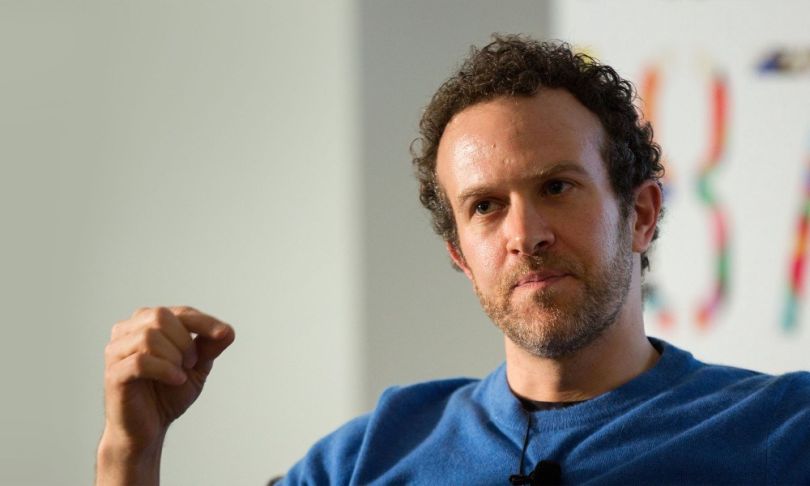In the early ‘90s, Jason Fried worked at a San Francisco startup that was hiring so quickly there weren’t enough desks — he and his coworkers crowded around card tables, working to meet impossible deadlines set by venture capitalists. He felt burned out.
Decades later, burnout is still a huge problem at tech companies — and in the broader workforce. A 2018 Gallup study found that 23 percent of full-time workers in the U.S. reported feeling burnt out at work “very often or always.” The World Health Organization recognized burnout as a medical condition for the first time this year.
When Fried founded his own company, Basecamp, in 1999, those early career experiences gave him a clear idea of what not to do. In his view, stress isn’t a prerequisite for succeeding in the tech industry.
On the contrary, Fried is intentionally pushing back against the idea that employees need to be busy all the time. He recently co-authored “It Doesn’t Have to be Crazy at Work” with Basecamp partner and Ruby on Rails creator David Heinemeier Hansson. The book outlines how the two created a less hectic work environment where employees are still laser focused on profits.
“Busy is not something that typically means you’re actually doing something meaningful. It just means you’re bouncing around between a bunch of stuff.”
“This idea that busyness is a badge of honor, it's broken, it's wrong, it's backwards. This idea that if we're busy, we're being productive, and if we're busy, we're valued: not true,” Fried said. “Busy is not something that typically means you're actually doing something meaningful. It just means you're bouncing around between a bunch of stuff.”
Built In talked to Fried about company-wide strategies for combating burnout.
-
Model behavior. Basecamp CEO Jason Fried tries to model the company’s culture tenets to employees by avoiding meetings, working eight-hour days and shunning email on the weekends.
-
Take breaks. Basecamp built mechanisms within the company to help employees avoid burnout, like offering employees a sabbatical, limiting work hours and avoiding crunch.
-
Set firm deadlines. Basecamp found that, by confining every project to a six-week deadline, teams are able to design simple, realistically scoped features and finish projects faster.

Give people time back by cancelling unnecessary meetings
Overworking employees is a common cause of burnout, which is why Basecamp caps work to eight hours a day, five days a week. Basecamp also offers employees who’ve been at the firm for three years a paid, 30-day sabbatical — a practice also employed by companies like Adobe Systems and Autodesk.
One way to get the same amount of work done with fewer hours to do is to limit the amount of time people spend in meetings. For Fried, endless hours spent in unnecessary meetings had become a major pain point in previous roles. So today he said the firm “really doesn’t have” meetings of three or more people together, with an agenda, in a single room. When discussions do occur, Fried said that it’s more of a one-on-one thing between staff.
When designing this tenet, Fried had other organizations to look to as culture models — every six months, staff at the software firm Healthify delete all the recurring meetings on their calendar and reflect on their usefulness, with the aim of ending them entirely. The founder of One Month, a coding school, insists on only blocking off time to meet one day per week, on Wednesdays. The founder of Photoshelter has found that he does his best, heads down work in the mornings and has abolished all meetings before 12 p.m. to accommodate his workflow.
Fried knew that making the practice work at Basecamp would require him to model the behavior he’d like to see among his staff.
“If I'm constantly asking for people to deliver work on the weekends, or if I'm emailing people, sending things in Basecamp at 10 at night, we're not going to be a calm company,” Fried said. “People are going to follow the leader.”
Smaller teams need fewer formal processes
Reflecting on his early career experiences, Fried also believed venture capital had placed too much pressure on the company to grow too quickly which, in turn, placed too much pressure on employees.
“The company had to run a thousand miles an hour, and you just can’t do that for very long until everyone burns out.”
“The company had to run a thousand miles an hour, and you just can't do that for very long until everyone burns out,” Fried said.
A blog post by Founders Collective titled “The Warning Label That Should Come With Venture Capital” published earlier this year echoed a similar point: more startups should be aware of the expectations surrounding the funding before they pocket venture capitalist cash, Founders Collective wrote.
Fried vowed to keep the small, family feel of Basecamp intact and let it grow organically. Today, Basecamp’s staff of just 56 serves millions of customers.
A layer of upper management — comprised of Fried and Heinemeier Hansson — heads the company, supported by a foundation of “working, part-time management” that includes the head of strategy, technical operations, data and similar positions, who work alongside the data analysts, programmers and customer service personnel they oversee.
“When you're smaller, everybody knows each other, there's more of a community, people are willing to help each other. There's less process, there are fewer meetings because there's smaller teams,” Fried said.
“It's going to be very hard to do the things that we do at a company of 5,000 people,” he continued. “Nothing really runs the way it should and everyone's kind of a little bit stressed out and anxious because it's just too big.”

Ironically, deadlines can help reduce stress
This isn’t to say the company has always gotten everything right.
When Basecamp first launched, the firm’s founders didn’t believe in deadlines. They used to schedule projects with no end date in sight and figured the firm would just launch new features whenever they were ready. No deadlines worked for some projects, but Fried said it slowed down others.
“What burns people out is working on projects that never end, and working on things that they don't like,” Fried said.
Basecamp decided to add end dates to projects, starting with quarterly feature launches. But Fried said that timeframe artificially slowed down his team’s progress, in adherence to Parkinson’s Law, which basically states that all work expands to fill the amount of time available.
“You get three months, it takes three months.”
“You get three months, it takes three months,” he said.
The firm then decided to try to finish projects every six weeks. Fried said speeding up development forces teams to simplify projects, which in his opinion usually results in better features.
“Six weeks felt like enough time to get anything meaningful done, but it’s also not too much time,” Fried said. “So we’re productive with our time and it also forces us to come up with simple solutions.”

Let Employees define the scope, design and approach
Fried — along with Head of Product Strategy Ryan Singer and Heinemeier Hansson — decide which projects teams are going to work on, based on customer requests and their own ideas for ways to improve Basecamp’s software. They draft about four rough ideas — like adding a calendar feature, or group chat, for example — that three-person teams of designers and programmers choose to work on during each six-week cycle.
After teams decide what feature they want to work on, it’s up to team members to decide the scope, design and approach to the project.
When building a new calendar, for example, Basecamp leaders knew that designing a full-fledged calendar would take at least six months — not six weeks. Moreover, the firm had actually installed calendars in previous versions of the software before, but had removed the feature after discovering only 10 percent of customers had used it. When a new customer requested the product, the leadership team felt compelled to add it again, however.
Rather than building a new calendar, Basecamp staff decided to build a two-month dot grid that labeled days with events scheduled with a circle. When users clicked on a day with a dot, the events for that day would scroll into view. Born out of the six-week project policy, the feature met the client’s needs without sprawling into a months-long undertaking.
“We like the pressure forcing us to simplify, simplify, simplify.”
“We like the pressure forcing us to simplify, simplify, simplify,” Fried said. “It's not so much time that you end up just stringing things out. It's also short enough that you have to get focused.”
After the six-week project cycle ends, Basecamp allows two weeks of unstructured work time for employees. Fried said they work on developing company features they’re passionate about, or fixing bugs they notice. At the end of each day, employees submit a written summary of what they’ve worked on through the Basecamp software, which allows management to stay updated on what features everyone is writing.
Get a feel for how the team is actually doing
If an employee is having trouble completing their work — or is exhibiting signs of burnout — Fried said their manager will have a conversation with them about what’s going on and why they think they’ve lost interest in their work.
“If you’ve ever been in a relationship with someone and it’s just sort of near the end, and everything begins to annoy you about that person, it’s the same thing that happens at a job, when every little thing becomes really annoying. That’s burnout,” Fried said.
At the end of the day, Fried said, building a work environment less prone to burnout came from seeing himself as an employee, not just an owner.
“You could call it selfish perhaps because I don't want these things for myself and therefore I don't want these for our company,” he said. “But it's like, this is how work should be. There is no fundamental reason why work should be crazy."




